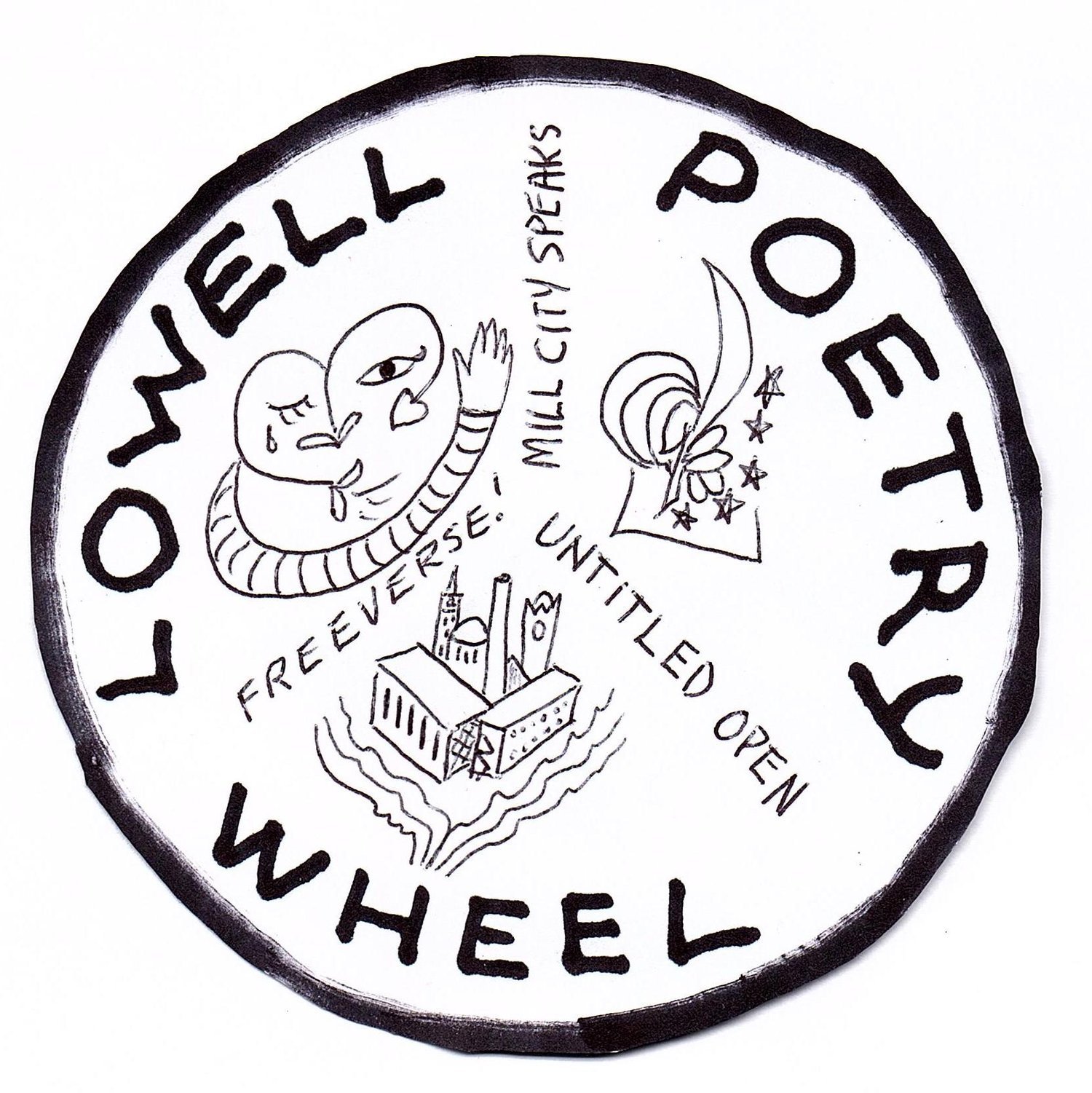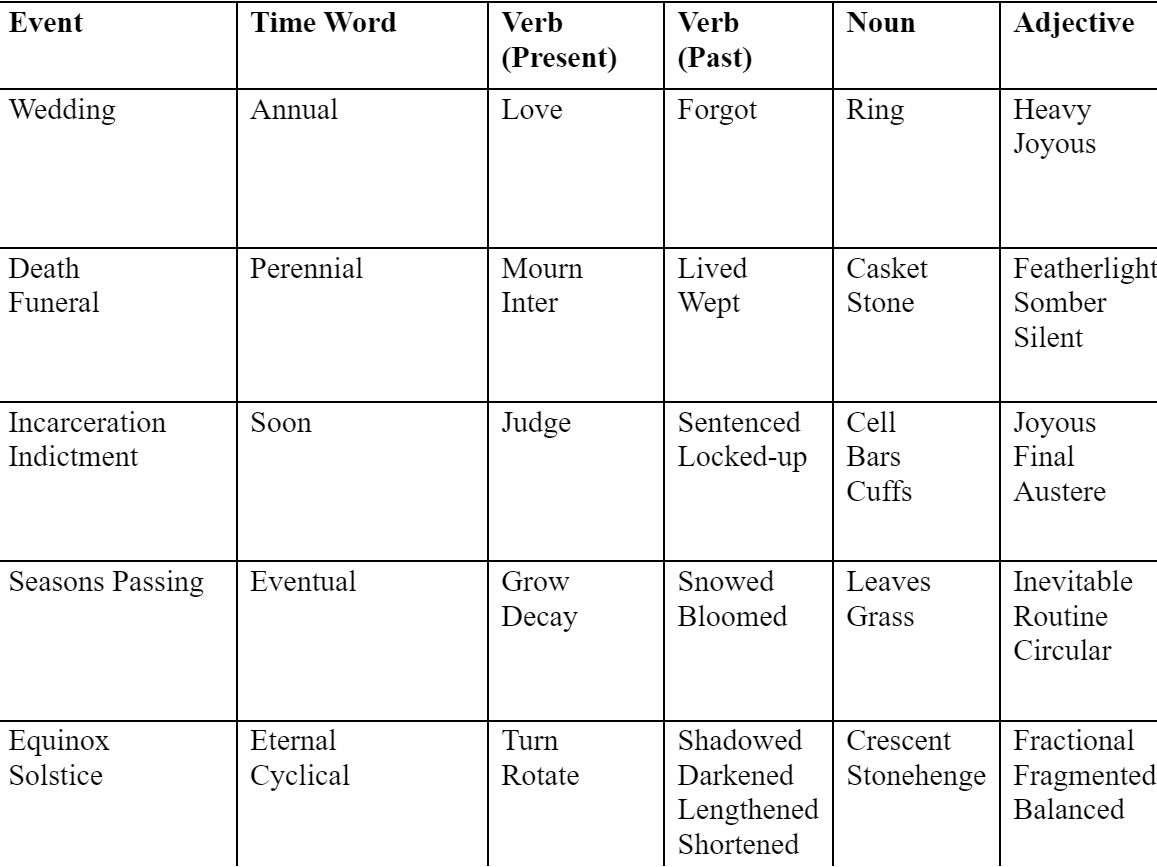June 2023 - Workshop Shit!
Following the prompt in May, which drew from the idea that humans are capable of senses beyond the five tangible senses we traditionally recognize (sight, hearing, touch, taste, and smell), and which invited poets to focus on the sense of balance, the June workshop expanded into an exploration of another sense. The sense of the passing of time is sometimes referred to as Chronoception, and it was this sense that poets sought to explore at the June workshop.
Carol Ann Duffy:
Last Post
https://www.youtube.com/watch?v=eItm1xbAwoo
“In all my dreams, before my helpless sight,
He plunges at me, guttering, choking, drowning.”
If poetry could tell it backwards, true, begin
That moment shrapnel scythed you to the stinking mud…
But you get up, amazed, watch bled bad blood
Run upwards from the slime into its wounds;
See lines and lines of British boys rewind
Back to their trenches, kiss the photographs from home -
Mothers, sweethearts, sisters, younger brothers
Not entering the story now
To die and die and die.
Dulce - No - Decorum - No - Pro patria mori.
You walk away.
You walk away; drop your gun (fixed bayonet)
Like all your mates do too -
Harry, Tommy, Wilfred, Edward, Bert -
And light a cigarette.
There's coffee in the square,
Warm French bread
And all those thousands dead
Are shaking dried mud from their hair
And queuing up for home. Freshly alive,
A lad plays Tipperary to the crowd, released
From History; the glistening, healthy horses fit for heroes, kings.
You lean against a wall,
Your several million lives still possible
And crammed with love, work, children, talent, English beer, good food.
You see the poet tuck away his pocket-book and smile.
If poetry could truly tell it backwards,
Then it would.
The Prompt:
Carol Ann Duffy’s poem imagines an alternate fate for an unnamed British doughboy in the trenches of WWI, and initiates this mirror-universe by reversing time from a certain point: “That moment shrapnel scythed you to the sinking mud …”
From that moment, Duffy moves backwards, following the unnamed soldier and his choices, from the trenches to a village square, where he has “several million lives still possible.” The poet wonders how the soldier’s life may have been different in a time of peace.
After reviewing the poem, poets created a graphic like the one below, and populated it with brainstormed words. Starting with a particular event, poets were encouraged to think forwards and backwards from that event. From there, they spent 15 minutes during a free write crafting poems that explored the passage of time.
Word-Bank from the Workshop
The Rules:
Consider the sense of Chronoception, or the sense of time passing time. How do we view time passing? Does it go in circles? Creep forwards or backwards? Or does it freeze in place?
Consider some events as well. What moments seem to stick-out in time? These can be personal memories (a party, a breakup, a graduation, a job interview), or they can be events of more global and historical impact (an election, the moon landing, a pandemic).
Use a graphic like the one above to help brainstorm and organize your thoughts.
Spend fifteen minutes writing a poem about a particular event, mindful of how time passes around that event.
If you’re happy with your poem, and you want to share it, feel free to post it in the comments section below.
Douglas’ Response:
MEMORIAL CONTRASTS
Your memorial had its share of weeping; mine, I think, not so much.
Your memorial was filled with joyous music with a sound man, six microphones, three guitars, two saxes, and a full trap set; mine will be quieter, with just a wooden flute and a box drum, under the trees (I will be satisfied if a pileated woodpecker, drawn by the wooden, rhythmic tapping, shows up to add a few staccato beats on the standing stump nearby).
Your memorial was filled by your beautiful daughters, both in the prime of their third decade, each fulfilled by the chance to mourn both you and their mother early, when they yet have a chance to be the best that they might be; mine will have no daughters at all, such hopes long since aborted.
Your memorial was festive and joyous, joking, jovial, and poignant; mine might carry something of such qualities if the few who remember choose to speak.
Maybe I should be envious or mindful of what it might take to avoid, as the Jews say, the second death of being forgotten.
But when I clock backwards to those last days before your passing,
Reverse engineer the life force back into your chest,
Let the lungs fill up and let go again and fill up again,
I see the lack of desperation in your eyes,
The way you forgot the names of the days of the week
And the faces of those who gathered around your bed;
The way you could not fathom the sorrow in their eyes;
The way you could not respond to more than the squeeze of the fingers,
Having lost the spirit that vivified your life even before losing life itself…
So let me rather scroll back into my own future,
Choosing to refuse to suffer such indignity.
Instead, let me walk into the deepest gathering of ferns,
Away from anywhere anyone would notice,
And let me lie down in a bed of green,
Released into freedom without obligation.
Andrew’s Response:
Remember how the stone looked, while below
The casket crept into its comfy place.
But restless there, it climbs back out. It grows
Until it hovers in the air. No face
Is mourning as they lift it to the church,
And salt runs upwards towards their laughing eyes.
Death’s feather-light when all these living lurch
Towards dawn, shake hands, repeat unsaid goodbyes.
Then, solstice-somber while the snow decays,
They’ll heft the heavy thing where weeping bloomed,
And slowly forwards they’ll return someday
To settle stories of beloveds doomed.
Remember how this stone looks, while below
The happy flowers rustle where they grow.

